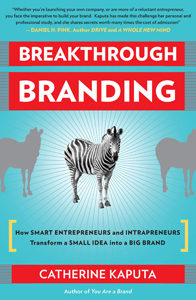If you haven’t tasted a lobster roll from Cousins Maine Lobster, you probably will soon. In five years, the start-up has gone from one food truck to a national franchise company with $20 million in sales.
How did the two founders do it? The cousins struck gold by using savvy branding every step of the way. Here are 5 branding tips from their phenomenal success story:
- Start with a “small” idea:
It’s important to realize that “small” ideas grow into big businesses and big complicated ideas confuse and go nowhere. CML’s elevator pitch was “to bring the Maine lobster experience” to the rest of the world: “Shore to truck” in 24 hours to create the freshest lobster roll possible.” In my book, “Breakthrough Branding,” I talk about the importance of beginning with a “small” idea, one that is focused, different and sets up a “unique selling proposition” (USP). The cousins saw an opportunity for their simple idea of a lobster food truck business because, outside of Maine, it was hard to get lobster except at pricey restaurants.
- Have a name that markets your story
The name, Cousins Maine Lobster, says it all. The founders were two cousins from Maine who had a reunion in Los Angeles in 2012. Encouraged by an evening drinking, they started reminiscing about their childhoods in Maine, family trips to the beach and eating lobster rolls for lunch. One thing led to another, and the two pooled their money, some $20,000, bought a food truck and launched Cousins Maine Lobster in Los Angeles.
- Fuel the brand’s growth with a PR game plan
The cousin’s “creation story” based on their idyllic Maine childhoods and family outings to the shore was made for PR since it had a lot of human interest. The team knew how to tell stories with lots of anecdotes about the Maine lobster experience. Local PR led to appearances on national media. The PR attracted the interest of “Shark Tank,” and the pair got a big break when they were invited to appear on the show. Mark Cuban may have dissed them on the show, but Barbara Corcoran invested $55,000 for a 15% stake.
- Evolve your plan to keep the momentum going
The original product was identical to the Maine lobster roll: soft roll, little bit of butter and gobs of lobster. To keep the momentum, they added fast-casual twists such as lobster tacos, and lobster tater tots with cilantro. They expanded their PR tactics beyond the Maine lobster experience story to their business success story. They had a great business startup story to tell. They franchised the business in 2015, and sales bounced from $2.6 M to $20 M in 2017. Now, the cousins have a book out, “Cousins Maine Lobster: How One Food Truck Became a Multi-Million Dollar Business.” They also set up a non-profit, “Cousins for a Cause” that is aligned with Big Brothers Big Sisters.
- Don’t be afraid to look stupid.
Many entrepreneurs are afraid to look dumb so they don’t ask questions in areas they don’t know well. The two founders realized that they don’t have all the answers. They leveraged Barbara Corcoran’s experience and contacts to aid growth. They traveled to Maine to meet with lobster fishermen and suppliers to understand the business better such as how to cope with fluctuating prices. They include a trip to Maine for the franchisees so they understand what’s unique about the Maine lobster experience and the business.
 The founders of Cousins Maine Lobster may not have started out with a lot of assets, but they did have an intuitive savvy about branding and PR, and pursued every opportunity to create a successful business.
The founders of Cousins Maine Lobster may not have started out with a lot of assets, but they did have an intuitive savvy about branding and PR, and pursued every opportunity to create a successful business.
 • Senator Kamala Harris will become the first woman vice president of the United States.
• Senator Kamala Harris will become the first woman vice president of the United States.